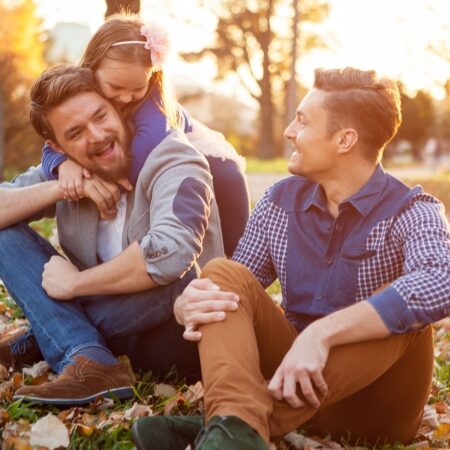LQBTQ+ Parental Rights is an area of Irish Family Law that is undergoing many changes with the development and progression of a more inclusive society. The following article will highlight what the current rights are for LQBTQ+ parents and families with respect to Irish law and legislation.
What is the Children and Family Relationships Act 2015?
The Children and Family Relationships Act 2015 is used within Irish law for making amendments to laws regarding adoption, guardianship, and assisted human reproduction, in addition to other issues.
This Act has created the right for same-sex couples to apply for the guardianship of a child that is in their care with the absence of any biological relationship to the child. However, there are specific requirements that LQBTQ+ parents must adhere to. To apply for guardianship, the couple must either be married, in a civil partnership or cohabiting for a minimum of three years. It also is required that the couple must have played a role in parenting the child for more than two years in order to apply for guardianship.
As of May 4th 2020, a provision in this Act has allowed for some female non-birth parents to be named as a legal parent of the child on the child’s birth certificate. Specifically, this means that, where the aforementioned requirements are met, it can be possible for females in same-sex couples to be classed as legal parents of the child and displayed as such on the child’s birth certificate.
How is Guardianship defined?
Under Irish law, guardianship of a child entails the duty of properly caring for the child, as well as the right to make decisions on their behalf regarding religion, secular education, health requirements and welfare in general. Where parents are married, they assume automatic joint guardianship and have equal rights in their parenting decisions regarding the child.
Where the child was born outside of a marriage, the right to guardianship is automatically assigned to the mother of the child.
Guardianship rights for LGBTQ+ parents must follow the requirements as set out under the Children and Family Relationships Act 2015, specifically relating to the point that a marriage, civil partnership or cohabitation must have existed between the same sex couple for three years, and the couple must have been involved with raising that child for more than two years.
Types of Guardianship
For same-sex relationships, a number of different routes to guardianship exist in the eyes of the State – namely; Assisted Human Reproduction, Surrogacy, Adoption and Fostering.
Assisted Human Reproduction
Assisted Human Reproduction services offer parents the opportunity to become legal guardians of a child.
In Ireland, there is no law or legislation on the matter of Assisted Human Reproduction, however, the drafted legislation referred to as The General Scheme of Assisted Human Reproduction 2017, as of March 2022, has received approval from the Cabinet for publication as the Health (Assisted Human Production) Bill 2022.
With continuous developments and amendments in recent times, it is possible that the aforementioned proposed Bill will be legislated in the near future.
Surrogacy
Currently, there is no law or legislation regarding the practice or use of surrogacy in Ireland. In situations related to surrogacy, any laws currently surrounding the birth of a child that was non-surrogate are being followed. This means that currently, the birth mother of the child assumes legal guardianship of the child, even when the child is not biologically her child.
However, with the approval by the Cabinet for the publication of the Health (Assisted Human Production) Bill 2022, the AHR Regulatory Authority will become responsible for overseeing the licensing and regulating of treatments such as domestic altruistic surrogacy.
Therefore, it could be possible to see the development of legislation surrounding surrogacy as a result, however, the timing on this issue is indefinite.
Adoption
Under the Adoption (Amendment) Act 2017, it is legally viable for an LGBTQ+ couple to adopt a child, even if unmarried. It does however require a civil partnership or cohabitation for a minimum of three years to allow for the application to adopt a child.
The passing of the Marriage Act 2015 has allowed for the inclusion of same-sex couples to the Adoption Act 2017, as long as the same-sex couple meet the same requirements.
Fostering
Fostering a child is a right of any individual or couple in Ireland and is not limited to any specific person regardless of marital status, relationship status, sexuality, cultural or religious status. The list of individuals who can become a foster carer is long and inclusive and allows for members of the LQBTQ+ community to create their application.
Conclusion
These are currently the rights of LQBTQ+ parents in Ireland. Developments towards more extensive and comprehensive legislation are ongoing and will continue to progress over time.
Are you an LGBTQ+ couple seeking advice regarding guardianship? Contact us today for more information and support visit Treoir and LGBT.ie.
[contact-form-7 id=”6114″ title=”Family Law Form”]



